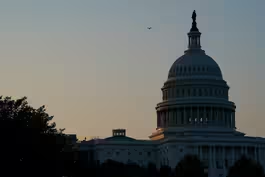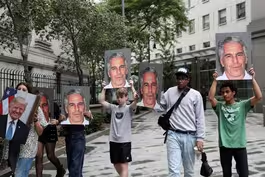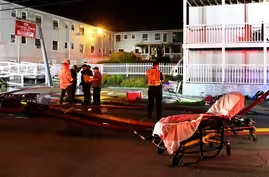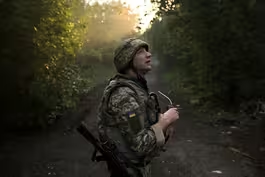
Ex-FEMA head on praise and criticism of Texas flood response
Clip: 7/14/2025 | 7m 23sVideo has Closed Captions
Former FEMA head responds to praise and criticism of federal response to Texas floods
The federal response to the flash flooding disaster in Texas has come under scrutiny. President Trump, who has called for cuts to FEMA, praised the agency during his recent visit to Texas, but did not comment on his plans for its future. William Brangham discussed more with former FEMA Administrator Deanne Criswell.
Problems playing video? | Closed Captioning Feedback
Problems playing video? | Closed Captioning Feedback
Major corporate funding for the PBS News Hour is provided by BDO, BNSF, Consumer Cellular, American Cruise Lines, and Raymond James. Funding for the PBS NewsHour Weekend is provided by...

Ex-FEMA head on praise and criticism of Texas flood response
Clip: 7/14/2025 | 7m 23sVideo has Closed Captions
The federal response to the flash flooding disaster in Texas has come under scrutiny. President Trump, who has called for cuts to FEMA, praised the agency during his recent visit to Texas, but did not comment on his plans for its future. William Brangham discussed more with former FEMA Administrator Deanne Criswell.
Problems playing video? | Closed Captioning Feedback
How to Watch PBS News Hour
PBS News Hour is available to stream on pbs.org and the free PBS App, available on iPhone, Apple TV, Android TV, Android smartphones, Amazon Fire TV, Amazon Fire Tablet, Roku, Samsung Smart TV, and Vizio.
Providing Support for PBS.org
Learn Moreabout PBS online sponsorshipWILLIAM BRANGHAM: It has been 10 days since the deadly July 4 flooding in Texas, where at least 132 people died, and the search continues for the roughly 160 people that remain missing.
A new report from The Washington Post found that Camp Mystic did not begin evacuating young campers along the Guadalupe River until an hour after a severe flood warning was sent.
In the meantime, the federal response to this disaster has also come under scrutiny.
Over the weekend, DHS Secretary Kristi Noem responded to allegations that FEMA cutbacks meant delays in answering people's calls for disaster assistance and aid after the flood.
KRISTI NOEM, U.S.
Homeland Security Secretary: Those claims have -- are absolutely false.
Within just an hour or two after the flooding, we had resources from the Department of Homeland Security there helping those individuals in Texas.
So those claims are false.
They're from people who won't put their name behind those claims, and those call centers were fully staffed and responsive.
WILLIAM BRANGHAM: President Trump, who has called for cuts to FEMA, praised the agency during his recent visit to Texas, but he did not comment on his plans for its future.
So, for a closer look, we are joined now by former FEMA Administrator Deanne Criswell.
Deanne Criswell, thank you so much for being here again.
I appreciate that it is complicated commenting on your successor's work, but, from your analysis, what is your sense of how FEMA has responded to this disaster in Texas?
DEANNE CRISWELL, Former FEMA Administrator: William, I mean, it is hard to watch from the sidelines because you know how you would do things.
But I think the thing that really stands out is, I know the women and men of FEMA, and I know how they would respond and the actions that they would take to make sure that they're moving resources in to have things available, to anticipate what that state might need.
And from the reporting that I have been reading, what it sounds like is that there's been added layers of administrative burdens that have been put in place that take away that agility that they normally have to be able to execute on their mission.
And so I know that they want to do the right thing, and I know that they have the capability, but it seems like there's additional steps that are making that process just a little bit more difficult now.
WILLIAM BRANGHAM: So what are some of the other specifics of things that you might have done differently if you were in the chair?
DEANNE CRISWELL: So, one of the first things we do, this is the kind of incident that is not like a hurricane, where you're watching it come in and you have days to move equipment and people in place to make sure that it's ready based on where the impact might be.
This is a limited-notice event.
And so you have already lost a little bit of that time, right, because the action or the incident is already unraveling.
And so I would have immediately made sure that the teams, and they wouldn't even have had to wait for me to tell them they would have known to do this, but moving urban search-and-rescue teams and critical personnel like our disaster survivor assistance team members into the area, into the community even before a presidential disaster declaration is made.
What we can't do is put them to work until after that declaration is made and the state asks for help, right?
And so once the state asks for that help, at least they would be there, they would be ready to be engaged immediately.
Now we have lost a few days.
And that's just time that you can't get back.
But I do want to add, right, the role that the Coast Guard played that the secretary talks about is critical.
The Coast Guard did amazing work, but they have it within their statutory authorities to be able to respond like that.
It's nothing new.
They do that in every one of these types of flash flooding events, because they have the resources and capability to get in there within minutes.
And then FEMA's role is to start to augment that capability with the technical teams that can come in and help support that ongoing search effort and the search and recovery effort and then help that community start to rebuild.
WILLIAM BRANGHAM: I want to ask you about the way in which we as a government allow people to build in a floodplain.
The Associated Press found that federal regulators had repeatedly granted appeals by Camp Mystic to allow them to continue building in an area that FEMA's own flood maps indicated might be highly dangerous in the future.
Doesn't that highlight the risk of allowing FEMA to grant exemptions like that?
DEANNE CRISWELL: You know, the flood maps are really designed to provide that snapshot in time of exactly where the highest risk areas are.
I can't speak directly to the situation of why they were granted an exemption without being able to see the data and the reasoning behind it, but there could be a number of reasons for that.
But you're right in the fact that the whole goal of this is to make sure that people are aware of what their highest risk is and that they're taking the necessary actions then to put the appropriate preparedness measures in place to protect the communities that they're serving or, in this case, the communities that are coming in to use this campground.
And so there could be a number of reasons for those exceptions.
I would have to see them.
But, again, it's a process that is done in partnership with local communities and with the state.
FEMA doesn't make these decisions on their own.
They have to do it in partnership with them.
I think that there's more to learn about this particular situation to understand the reasoning behind it.
WILLIAM BRANGHAM: President Trump, as you well know, has suggested dramatically dialing back the role that FEMA plays and, in a way, making the states pick up a lot of that labor of immediate disaster response.
Do you believe that states can shoulder that burden?
DEANNE CRISWELL: States and local emergency managers have always had the responsibility to respond.
FEMA doesn't come in and take over that.
FEMA doesn't come in and supplant that.
FEMA comes in and supports them when it exceeds their capability.
But at the end of the day, they will always have that responsibility for immediate response needs and for the actual recovery.
What's going to be challenging, if you start to scale back the role that FEMA has, is, they're not going to have the tools and resources to augment and to support that response process, like search-and-rescue teams.
But, more importantly, they're not going to have the financial support or technical assistance to help them rebuild during this recovery phase.
And so it's easy to oversimplify some of the things that we're saying about giving more responsibility to state and locals, but it's much more complicated than that.
And I think it deserves a very thoughtful, inclusive conversation with those people, the state and local emergency managers that have this responsibility, to make sure that we're building a government system that works for them and not against them.
WILLIAM BRANGHAM: All right, that is former FEMA Administrator Deanne Criswell.
Always great to talk to you.
Thank you very much for your time.
DEANNE CRISWELL: Thanks, William.
Big Beautiful Bill could accelerate private education shift
Video has Closed Captions
Clip: 7/14/2025 | 7m 15s | How a 'Big Beautiful Bill' provision could accelerate a shift toward private education (7m 15s)
Critics on their favorite and most anticipated summer movies
Video has Closed Captions
Clip: 7/14/2025 | 8m 35s | Film critics reveal their favorite and most anticipated summer movies (8m 35s)
GOP faces deadline to cut foreign aid, public media funding
Video has Closed Captions
Clip: 7/14/2025 | 5m 8s | Republicans face deadline to claw back funding for foreign aid and public media (5m 8s)
A look at the split in Trump's base over the Epstein files
Video has Closed Captions
Clip: 7/14/2025 | 2m 57s | A look at the split in Trump's base over the Epstein files (2m 57s)
News Wrap: Assisted-living facility fire kills at least 9
Video has Closed Captions
Clip: 7/14/2025 | 5m 14s | News Wrap: Fire at assisted-living facility in Massachusetts kills at least 9 (5m 14s)
Tamara Keith and Amy Walter on fallout of the Epstein case
Video has Closed Captions
Clip: 7/14/2025 | 7m 32s | Tamara Keith and Amy Walter on the political fallout of the Epstein investigation (7m 32s)
What's behind Trump's shift on arming Ukraine
Video has Closed Captions
Clip: 7/14/2025 | 8m 29s | What's behind Trump's shift on arming Ukraine and his threats against Russia (8m 29s)
Providing Support for PBS.org
Learn Moreabout PBS online sponsorshipSupport for PBS provided by:
Major corporate funding for the PBS News Hour is provided by BDO, BNSF, Consumer Cellular, American Cruise Lines, and Raymond James. Funding for the PBS NewsHour Weekend is provided by...


















